De DVS is aanwezig bij het International Viola Congress 2016 in Cremona. Hier brengen DVS-bestuursleden Kristofer Skaug en Karin Dolman dagelijks verslag.
Jump to English Translation below.
Donderdag 6 oktober 2016
We kregen deze ochtend eerst 17 (!) van de 41 Caprices van Campagnoli te horen, dapper gebracht door de heel erg vroeg opgestane altvioolklas uit Birmingham. De ene beter wakker geworden dan de andere. Het gaf een goede kijk op het doorsnee niveau van de conservatoria. Meestal krijgen we alleen de beste studenten te horen, dat geeft uiteraard een vertekend beeld. Ze speelden bijna allemaal de etude uit hun hoofd. Er is goed gestudeerd. Uitspringers: Rebecca Stubbs, Matthew Johnstone, Martha Evans en Yu Yue.
Er wordt soms luchtig gedaan over het oeuvre van Alessandro Rolla. Maar deze ochtend kregen we van de Italianen een authentiek pleidooi voor deze componist, eerst bij monde van dr. Pietro Zappalà. Hij heeft een nieuwe website opgericht voor zijn research rondom Rolla, waar heel nauwkeurig kan worden gezocht tussen zijn honderden werken voor altviool. Vervolgens speelde het Ierse Collailm duo een Rolla-Concertante voor viool en altviool met veel charme. En tot slot stond Benedetta Bucci op het podium. Onthoud die naam! Ze mag zelfs voor een Paganini-lookalike doorgaan. Ze bracht het altvioolconcert van Rolla met heel veel overtuigingskracht en warm uitgedragen liefde voor deze Mozarteske muziek. Het gevoelig begeleidende strijkkwartet maakte het concert nog intiemer. Er kwam dan ook zeer spontaan bijval uit de zaal. En ik merkte dat de muziek mij wel geraakt had.
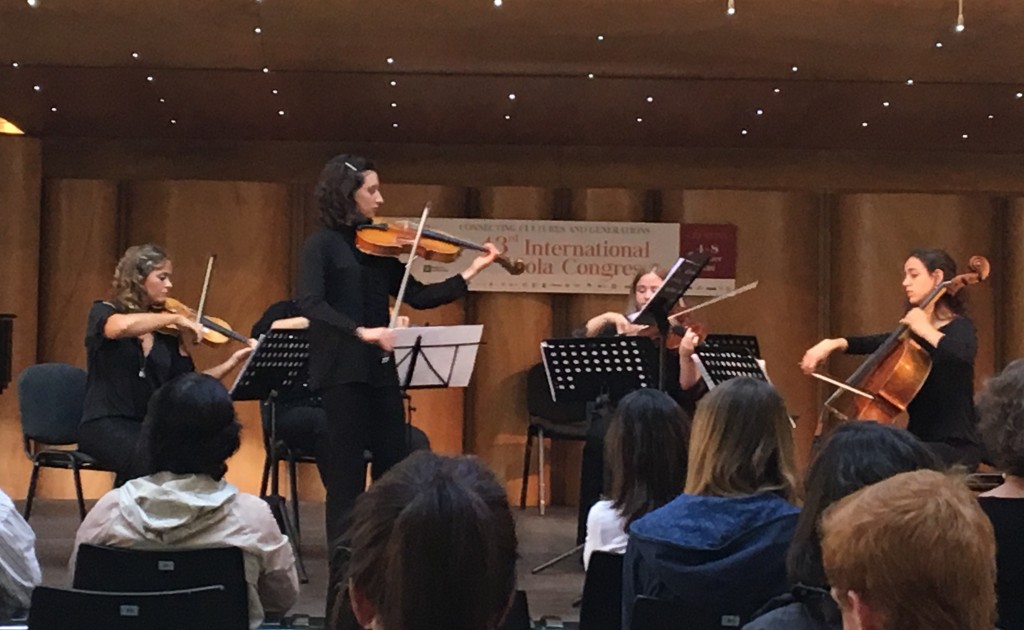
Over authentiek gesproken: Daarna waren onze Portugese vrienden aan de beurt. En zoals altijd maakten ze er werkelijk een feest van. Veel ensemblemuziek, en in de tweede helft begeleidden ze met z’n zessen Portugese gitaar en gitaar. Een frisse atlantische bries van folklore, geweldig! Het zou fijn zijn om meer van dit soort optredens te zien op de IVC.
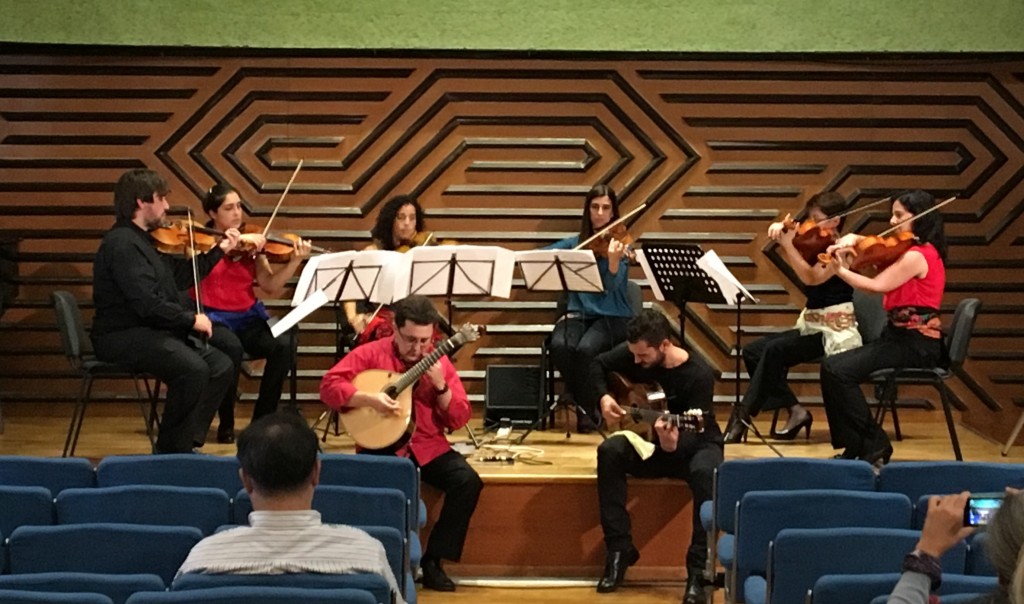
Er was nog even tijd om een deel van het recital van Chiara Morandi te horen, o.a. de vrij onbekende sonate van Granville Bantock (1868-1946) en de suite van Bloch. Een kundige en temperamentsvolle altvioliste, goed begeleid op de piano door Michela Spizzichino. Maar om 13u moesten we ertussenuit knijpen om naar het tweede straatconcert te luisteren van de nederlandse studenten. Helaas werden hun mooie altvioolklanken op Piazza Stradivari een beetje overstemd door de vuilnisophaalwagens.
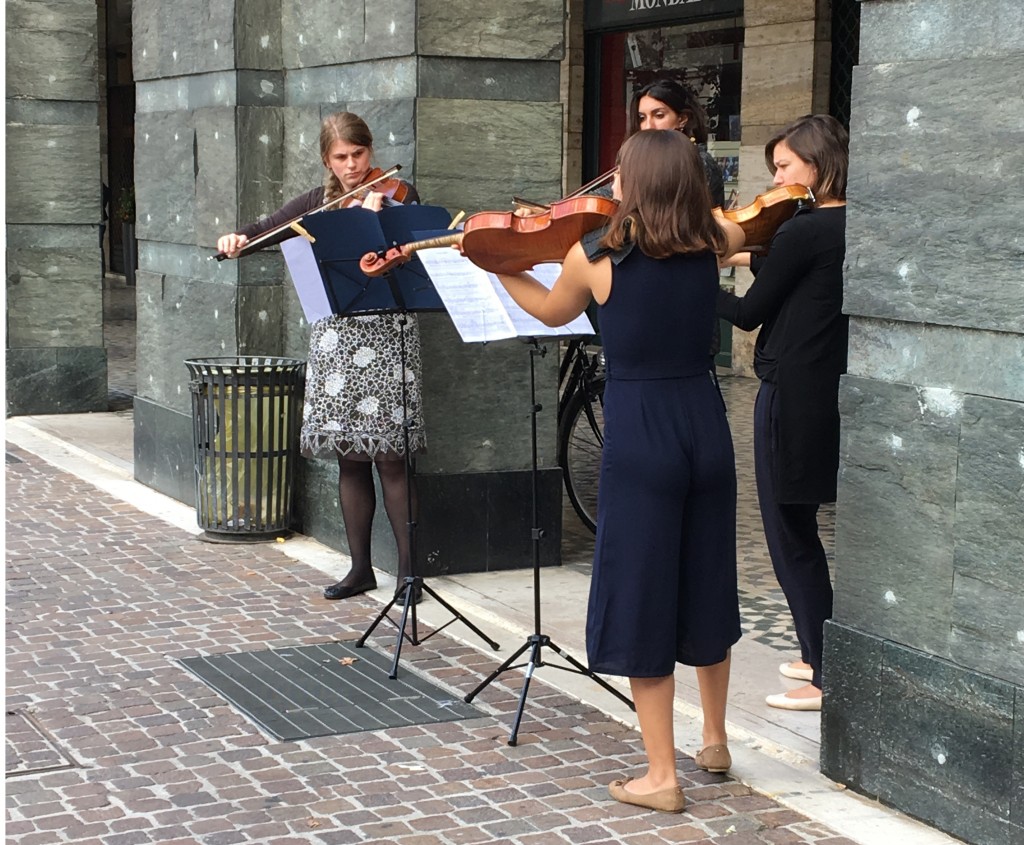
De traditionele vergadering van de besturen van alle bij IVS aangesloten Viola Societies volgde kort hierop. Er werden diverse huishoudelijke onderwerpen besproken. En natuurlijk vertelden wij hoever we zijn met de organisatie van het congres 2018, inclusief schriftelijke steunbetuigingen van belangrijke partners in Rotterdam. Iedereen was enthousiast, dus we kunnen doorgaan met de organisatie. Maar pas als we een sluitende financiële begroting hebben, krijgen we definitief groen licht van de IVS.

Tussendoor gaven onze vrienden van de Portugese Viola Society (APVDA) een interessante presentatie over de enorme groei van de altvioolcultuur in Portugal in de laatste 15 jaar. Dit is mede te danken aan een onderwijsreform in 2008, waarin fors is geïnvesteerd in de muziekopleiding: elk jaar zitten zo’n 5000 portugese kinderen van 12-17 jaar in fulltime muzieonderwijs, geintegreerd met school. Bizar om te bedenken dat Nederland in diezelfde jaren het muziekonderwijs kapotbezuinigd heeft.
Daarnaast krijgen portugese kinderen in het beginnersstadium (6-7 jaar) direct al een altviooltje onder de kin geschoven, in plaats van de gebruikelijke viool. Het resultaat liegt er niet om: op de landelijke altviooldag in 2013 kwamen 350 deelnemers, waarvan een meerderheid jongeren. De IVS heeft alvast een speciale onderzoekscommissie erop afgestuurd om het geheim achter dit opvallende succes beter te begrijpen.
Deze “feel-good story” werd gevolgd door een behoorlijk zwaarmoedige recital met 20e eeuwse muziek uit Polen. Werken van Spisak, Bacewicz en Penderecki mondden uit in het “Musiquette” voor 3 altviolen van Górecki: Met hele extreme scordatura‘s (de drie instrumenten waren totaal verschillend verstemd, tot in hele diepe registers) werden hele ongewone klanken geproduceerd, o.a. een soort ‘drone’ die je totaal niet van een lieflijk snaarinstrument zou verwachten. Erg goed – en ook, ja, authentiek! – gespeeld door de drie poolse altviolisten Maliszewski, Stanislawska en Guzowska.
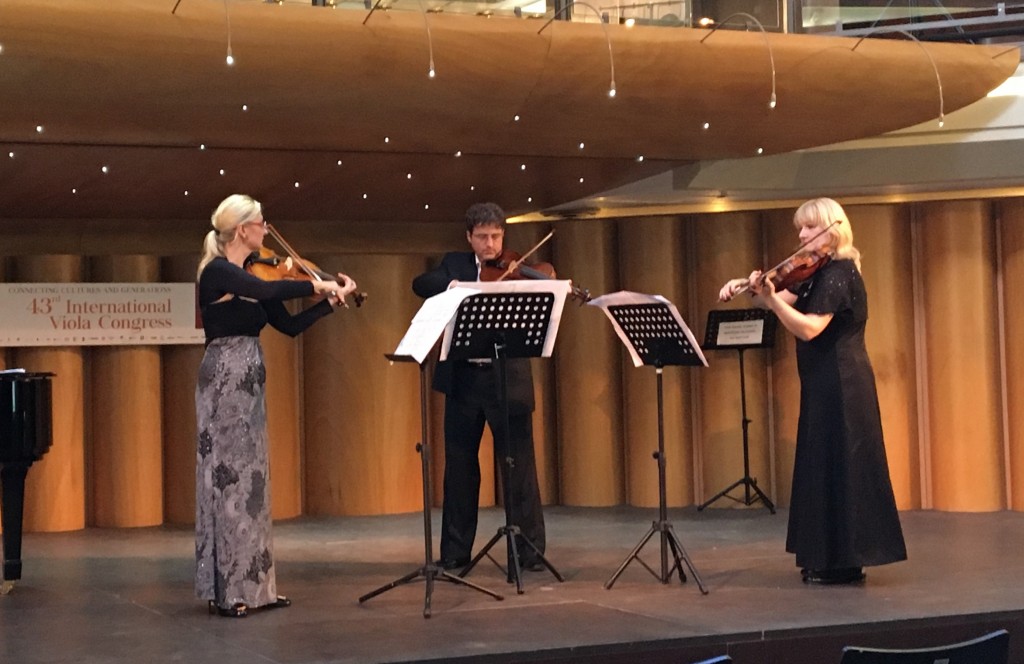
Bruno Giuranna kwam vervolgens het podium op om zijn liefde voor Brahms met ons te delen. Zo was in één keer de programmering van de twee Brahms-kwintetten gisteravond verklaard, ook al had hij het nu in principe over de klarinet-/altvioolsonates op. 120. Eerst belichtte hij waarom sommige elementen van de altviooltranspositie (met name de octavering) soms ongelukkig uitpakt. Maar gaandeweg draaide het verhaal meer in de richting van een “sightseeing” van al zijn favoriete plekken in deze sonates. Boeiend, vol enthousiasme en humor verteld. Je begrijpt het: Ook dit was uiterst authentiek.
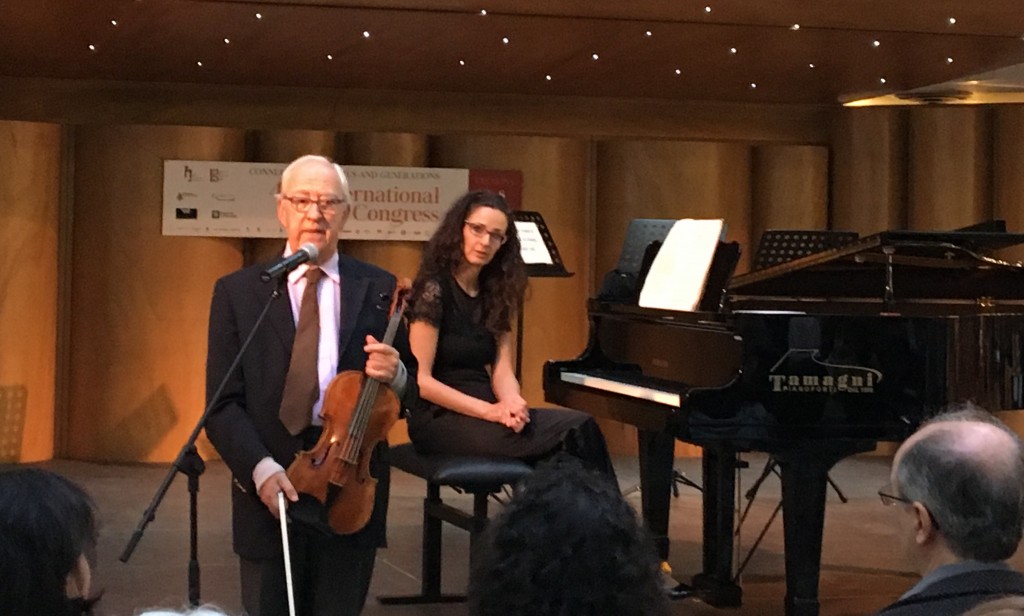
We hielden nog net genoeg tijd over voor een zaalrepetitie in het auditorium van onze belangrijke recital morgen. We konden een soundcheck doen op de electronica-opname van Raquel, en het kwartet “Frayed Ribbon” werd voor het eerst in surround-opstelling geprobeerd. Heel effectief! Helaas kregen we ook vanavond het trieste bericht dat onze meezingende jazz-sopraan en componiste Viola Rossi morgen verstek moet laten gaan ivm een gebroken rib! Dus we zullen haar stuk “Thoughts of theft” moeten schrappen van het programma.
‘S avonds was de finale van het “Città di Cremona” altvioolconcours in de San Agostino kerk, even verderop. De drie finalisten waren (in volgorde van optreden):
Muriel Razavi (1992, VS/Iran) – Walton concert
Matthew Cohen (1988, VS) – Bartok concert
Raphaël Pagnon (1992, Frankrijk) – Walton concert
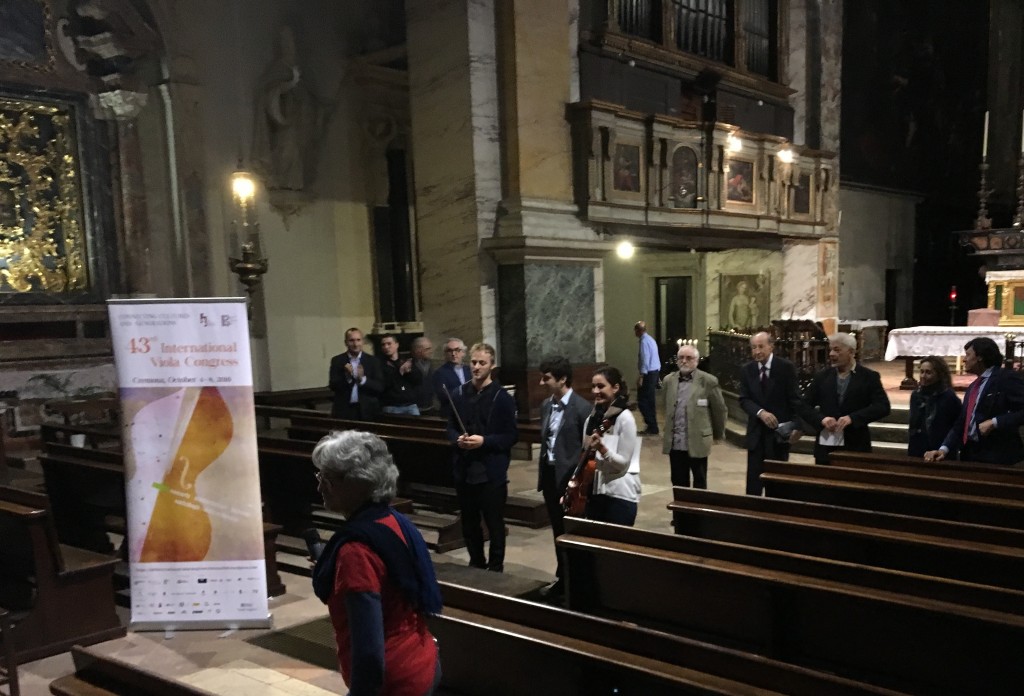
Ze speelden alledrie goed, en de zeskoppige jury had een zware klus. Uiteindelijk heft de jury echter besloten om geen 1e prijs toe te kennen. De gedeelde 2e prijs ging naar Razavi en Cohen. Ik had daar wel vrede mee, maar ik hoorde velen om mij heen die juist vonden dat de als 3e geëindigde fransman de beste was. Ook hierbij werd vaak verwezen naar een vermeend gebrek aan authenticiteit bij deze en gene kandidaat.
Het woord van de dag is dus …
Thursday October 6th, 2016
This morning we were served 17 (!) out of the 41 Campagnoli Caprices, bravely performed by the very early risen viola class from Birmingham. Some seemed somewhat more awake than others. At least it offered an honest look at the diversity of students at a conservatory. We often see only the best students performing. These students had prepared well though, they mostly played by heart. Some of the positively noticeables included Rebecca Stubbs, Matthew Johnstone, Martha Evans en Yu Yue.
There are those who think lightly about the works of Alessandro Rolla. But this morning, our Italian hosts treated us to an authentic plea for this composer. First through a presentation from dr. Pietro Zappalà. He has created a new website about his research on Rolla, including a very advanced search engine applied to his hundreds of works for viola (and violin). Next the Irish violin/viola sisters-duo Collailm performed a Rolla Concertante with a lot of charm. And finally, Benedetta Bucci took the stage. Remember that name! She even looks like Paganini himself. Her rendition of the Rolla Viola Concerto was full of conviction and love for this Mozartesque music. The string quartet accompaniment made this concert even more intimate. The spontaneous applause from the audience echoed my feelings, this certainly struck a nerve!
Speaking of authenticity: Our Portuguese friends were next, and like always they really know how to make a musical party! A lot of ensemble pieces, mostly written on commission by Portuguese composers. In the 2nd half of the programme, the viola sextet of the APVDA accompanied a Portuguese guitar and a regular guitar. A fresh Atlantic breeze of folklore, great! It would be nice to see more performances like this at the IVC. .
We only had time to catch a part of the recital of Chiara Morandi, including the little known sonata by Granville Bantock (1868-1946) and the Bloch suite. A skillful and temperamental violist, with good accompaniment on the piano by Michela Spizzichino. Midway through the programme, however, we had to sneak out in order to witness the second street concert of our Dutch students. Unfortunately, their beautiful viola sounds at the Piazza Stradivari were partly drowned out by the garbage collection trucks.
The traditional IVS gathering of the Viola Society Section heads followed shortly after this. Various proposed changes to the IVS By-laws were discussed, and other internal matters. Most significantly for our part, we were able to present the progress of our plans to host the IVC in 2018, including written letters of intent from important partners in Rotterdam. Our fellow Viola Societies were very enthusiastic about this prospect, but the definitive go-ahead and official nomination can only take place after we present sufficient evidence of financial security in the plans.
Amidst all of this, our friends of the Portuguese Viola Society (APVDA) gave an interesting presentation about the remarkable growth of the viola community in Portugal in the past 15 years. One of the key factors in this development was an education system reform in 2008, in which the government decided to invest heavily in music education. Since then, some 5000 Portuguese children (age 12-17) are enrolled in a full time integrated music school programme every year. It is bizarre to recall that, in that same period, the Dutch government all but annihilated music education in Dutch schools.
Furthermore, Portuguese children in the beginners’ stages (6-7 years) are systematically offered a viola as first instrument, rather than first trying a violin. The results of all this cannot be ignored: The national viola day in 2013 drew some 350 participants, most of which were very young. The IVS is looking to learn from this success.
This “feel-good story” was succeeded by a rather dark-mooded recital of 20th century Polish works for viola. Compositions by Spisak, Bacewicz and Penderecki were concluded with the “Musiquette” for 3 violas, by Górecki: This piece requires very extreme scordatura‘s (all three instruments are tuned differently, including some very deep registers), with which some very unusual sounds were generated, e.g. a kind of ‘drone’ that you totally wouldn’t expect from a group of string instruments. A very good – and, yes, authentic! – performance by the three Polish violists Maliszewski, Stanislawska and Guzowska.
Bruno Giuranna next took the stage to share with us his love for Brahms. This at once explained the programming of the two quintets last night, even though in principle he was now talking about the clarinet/viola sonatas op. 120. He started out by analyzing why some aspects of the viola transcription (especially the octave shifts) at times have ab unfortunate effect. But gradually the story turned more into a sight-seeing of Giuranna’s favourite passages in these sonatas. An interesting tour, full of enthousiasm and humour. Yes indeed: This, too, was very authentic.
There was just enough time left for a dress rehearsal in the main auditorium for our important recital tomorrow. We finally had a soundcheck for Raquel’s pre-recorded electronics. And we had a chance to try the “Frayed Ribbon” quartet in a surround set-up, with the four violas stationed on the balcony and stage. Very effective! On the down side, we received the sad news that our performing Jazz soprano and composer Viola Rossi cannot make it to Cremona tomorrow for the concert, due to a painful broken rib. So we will have to scrap her piece “Thoughts of theft” from the programme.
In the evening we went to the final round of the City of Cremona Viola competition, in the San Agostino church nearby. The three finalists were (in order of appearance):
Muriel Razavi (1992, USA/Iran) – Walton concerto
Matthew Cohen (1988, USA) – Bartok concerto
Raphaël Pagnon (1992, France) – Walton concerto
All three played very well, and the jury had a difficult task. In the end, however, the jury decided not to award a 1st prize. The shared 2nd prize went to Razavi and Cohen. I could well live with that decision, but many people around me thought instead that the Frenchman was the best, referring to unequal levels of authenticity among the candidates.
So the buzzword of the day is …
